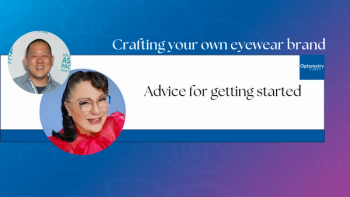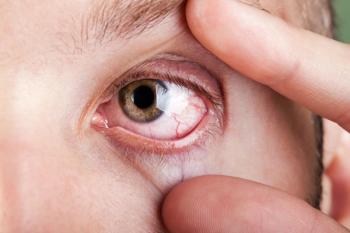
VEW 2024: Debunking myths in order to integrate myopia management into your practice
Brianna Rhue, OD, FAAO, FSLS, shares her passion for myopia management and control at this year's Vision Expo West.
Before integrating myopia management into your practice, Brianna Rhue, OD, FAAO, FSLS, advises that your passion in the speciality should be serious. She gives her suggestions on where to start in your quest for myopia management integration in your practice at the 2024 Vision Expo West conference with her presentation, "Myopia Control". The presentation was given alongside Milton Hom, OD, FAAO.
Video transcript
Editor's note: This transcript has been lightly edited for clarity.
Emily Kaiser Maharjan:
Hi everyone. I'm here with Dr Brianna Rhue who is here to discuss her Vision Expo West presentation with Dr Milton Hom on myopia control. So thank you so much for taking the time to chat with me today.
Brianna Rhue, OD, FAAO, FSLS:
Thank you, Emily. I'm excited to share one of my passions which changed my practice and the lives of my patients.
Kaiser Maharjan:
Yeah, so first, can you tell me a little bit about your presentation on myopia control?
Rhue,
Yeah. So it's still fairly new, this whole myopia control, myopia management arena in the eye care space. So just having our first FDA approved treatments come in 2020 there's still a lot of myths that we need to debunk. So we're going to be sharing some studies around it, some case studies that we've done in our own clinics, really get into the treatment protocols and then also follow up with some implementation to bring it back to your practice and start practicing to a higher standard of care with your myopia patients.
Kaiser Maharjan:
Fantastic, and for somebody who has not yet dipped their toes into myopia and is a little bit nervous about it, where can they get started?
Rhue:
Come over here, it's so much fun. So it starts with knowledge, which is really what Expo is really good at. So getting the CE requirements, seeing people that are doing it, getting those questions answered. So how this presentation is made was I went to a conference that was 4 days long, and I came back and I was like, "Oh my God. I just wish they would have said this, because then I would have gotten it so much easier." So it's like 4 days of a conference condensed into an hour and 40 minutes, or a 2 hour presentation on just top level what do you need to know, why you're doing it, and then go for it.
Kaiser Maharjan:
I know you mentioned that myopia control has changed your practice. Can you tell me a little bit about your personal experience with myopia control?
Rhue:
Yeah. So we're taught in school to find your niche, find your niche, find your niche. That was just eating my brain. I graduated in 2009, I did my residency in 2010, I joined a private practice. Here comes 2015, and I was just like, "Oh, my God, is this what I have to do the rest of my life, which is to say, '1 or 2'?" I can count to 8, so it's got up to 8.
But when I was pregnant with my first son, who is now 8, being a high myope myself, marrying a high myope with my husband, I just did a random search on what can we do to slow down myopia. I realized really quickly how far away from the rest of the world we were in implementing strategies to help patients not have to live a life as a high myope. Really, when you hit that -3 is really like you're now dependent on your glasses. Really about a -2.50 and you're dependent on your glasses. So if we can catch kids earlier, do that together with FDA approved treatments, your parents and your patients will come in asking this.
So I will give a warning here. If you do not want to do myopia management, don't start it, because it is a weed in your practice that will grow and grow and grow and grow and it will start to take over your practice, which is what I wanted. I wanted something better. I wanted something that I could get behind that I was passionate about. So if myopia is not your jam, that's okay. Maybe it's glaucoma, maybe it's dry eye, maybe it's esthetics, maybe it's pediatrics. So just be true to yourself, be true to your passion, and then that's where your patients feed off of that, and that's where you feed off of them.
Kaiser Maharjan:
Yeah, absolutely. And so myopia has been such a hot topic in the optometric industry. It is a huge buzzword right now because everybody's talking about it, which is fantastic, but the messaging can get kind of lost in the noise. But if you could distill it down even further into the top 3 things that everybody should know about myopia control, what would you say that they are?
Rhue:
Yeah, top 3 things are you already have a myopia clinic, just go after it. Even before Vision Expo, if you're watching this after Expo when you go back, 70% of the patients that you're going to see that day are myopic. So you already have it now, you just get to plant those seeds and figure out what it is. Understand the treatments. Right now in the US, you have atropine, you have your dual focus lenses, and you have ortho-k. So MiSight from CooperVision, which is FDA approved, you have the Abiliti lens which is ortho-k. I want to debunk some myths around ortho-k because it's all topography-based, and it is just a game changer for your practice and your patients. And then atropine. Atropine getting a lot of slack right now because of the unknown. There's no unknowns really here anymore. There's a few not saying that there's not. But it's very safe, it's very effective, and we have, hopefully, some treatments that will be approved soon.
They have spectacles that are coming. I think spectacles are not the way. We want to give our kids freedom. We want to be the advocate for our kids. I was a young myope, so got my first pair of glasses in second grade. Got my first pair of contacts in third grade. Thank God to my mom pushing the doctor, and it just changed my perspective. I was timid, now I have these big purple glasses on. That doesn't work. So just the freedom it gave me, don't wait for spectacles to be the saving grace here. That's not the answer. It's part of the equation. But there's other things that you need to do to advocate for your patients.
Kaiser Maharjan:
Yeah, absolutely. I mean, it's always going to be about what's best for the patient in your chair, and not necessarily 1 cure-all that's going to be good for everybody. So I know that you're also doing a presentation about myopia, dry eye, and ocular esthetics. Can you tell me more about that event?
Rhue:
Yeah, so Thursday night, my cofounder of Dr. Contact Lens Jennifer Tepiza and myself, we're hosting a dinner for 100 doctors. We have just a few slots left on really the implementation. So these hot topics: dry eye, esthetics, myopia management. The education piece of it is a big piece of it, right? You have to learn how to talk about it. You have to learn just questions and be prepared for questions that, shoulders back, you're confident that you're providing care. Then there's another pillar, which is implementation. And we don't spend a lot of time there, so that's what this dinner is going to be. So we've got 13 awesome sponsors in the industry that are going to be there, also supporting us and just a good time. Dinner, cocktails, and learn how to take care of your patients and take care of your practice so we can keep going back to Vegas.
Kaiser Maharjan:
Yeah, absolutely. Is there anything else that you want to touch on that we haven't talked about yet?
Rhue:
I'm excited to see everybody at Expo. Again, lean into your exhibitors. They are there to support you 100%. Ask better questions. Don't go in asking what something costs. Ask what the investment is, how it's going to better patient care, how the support is going to be. They're there to partner with you and that's where we get education in the Education Hall and we get way more education in the Exhibit Hall. So when you're walking out of education, go to the Exhibit Hall, because I see education getting out and everybody swarms away from the exhibit hall, and I'm like, "You're going the wrong way!" So there's my shameless plug for all of our vendors.
Kaiser Maharjan:
Alright. Well, thank you so much for taking the time to chat today, Dr Rhue. This has been absolutely wonderful. It's always wonderful to talk to you about myopia control.
Rhue:
My pleasure. Thanks, Emily. See everybody at Expo.
Newsletter
Want more insights like this? Subscribe to Optometry Times and get clinical pearls and practice tips delivered straight to your inbox.













































